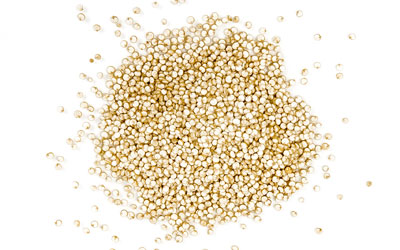Quinoa has gained widespread attention in recent years due to its high nutritional value. This pseudocereal is rich in dietary fiber, protein, and essential phytochemicals, making it a valuable addition to a healthy diet.
Discoveries associated with the relationship between diet and chronic health conditions have led to significant interest in whether quinoa can improve metabolic markers.1 This 2024 meta-analysis of clinical trials investigated the effects of quinoa in managing blood sugar levels as well as body weight and other metabolic markers.
The Study
Researchers conducted a meta-analysis of seven published clinical trials, comprising a total of 258 adult participants. The mean ages of the participants ranged from 31 to 64 years, and the trials had varying durations, from 28 to 180 days.
Participants were given quinoa in amounts ranging from 15 to 50 grams per day, and results from quinoa supplementation were compared with a placebo group to determine its effect on the three main outcomes: fasting blood glucose, body weight, and body mass index (BMI).
The study also performed a dose-response analysis to assess how different levels of quinoa intake affected fasting blood glucose. Their findings were published in the Current Medicinal Chemistry journal.
The Results
The most significant finding of the study was quinoa's effect on lowering fasting blood glucose levels. Quinoa intake led to a more pronounced reduction in fasting blood glucose when consumption reached approximately 25 grams per day. Interestingly, increasing quinoa consumption beyond a moderate amount (25 grams per day) did not result in further glucose-lowering benefits.
Additionally, researchers found that quinoa supplementation did not have a significant impact on body weight or BMI.
What Does this Mean?
This meta-analysis provides valuable insights into quinoa's role on metabolic health, particularly its role in regulating blood glucose levels. This is especially significant for individuals managing or at risk of type 2 diabetes, where fasting blood glucose serves as a key marker of glycemic control.
The findings suggest that moderate daily consumption of quinoa can have a beneficial effect on blood glucose regulation. Specifically, researchers identified an optimal intake of approximately 25 grams per day, which maximizes quinoa's glucose-lowering benefits. Larger quantities did not produce proportional improvements, emphasizing the value of moderation.
In addition to quinoa, other herbs that may support blood sugar control include cinnamon, fenugreek, turmeric, and flaxseed.
Sources
- Current Medicinal Chemistry, Does Quinoa (Chenopodium quinoa) Consumption Improve Blood Glucose, Body Weight and Body Mass Index? A Systematic Review and Dose-Response Meta-Analysis of Clinical Trials, 2024
Footnotes:
- Nutrients. (2023). The Role of Nutrition in Chronic Disease. Retrieved October 2, 2024, from https://www.ncbi.nlm.nih.gov/pmc/articles/PMC9921002/







